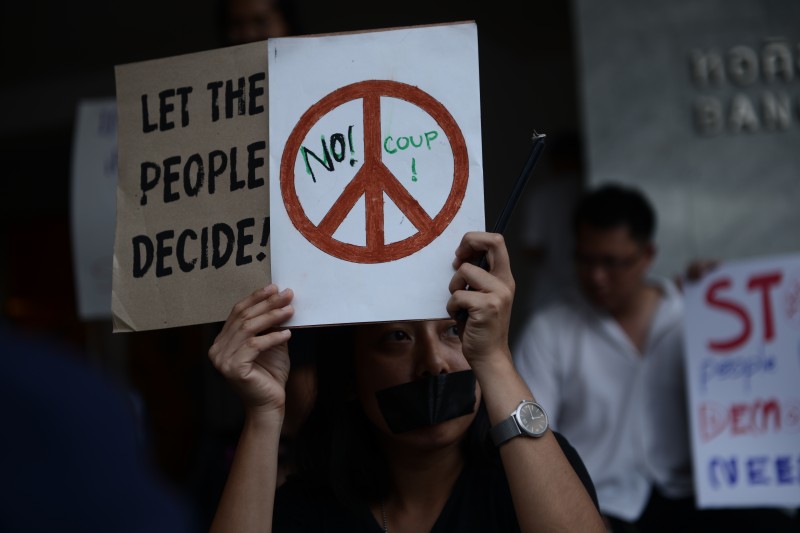
Thai citizens who do not agree with the declaration of Martial Law in Thailand have joined together to express their opposition to martial law. Photo by Anuchid Lermsum, Copyright @Demotix (5/20/2014)
The army initially ordered 14 TV stations to cease or suspend operations. Then it closed down 2,000 radio stations across the country.
Bangkok Pundit translated the army declaration which contains many provisions undermining press freedom and the political rights of Thai citizens. Order Number 3 prohibits media, including online media, to report stories that will create ‘misunderstanding’:
prohibits media from presenting news that affects peace-keeping of officials…states that all media entities including online who have the intention to distort, incite, or create disorder or have messages that will make the people to be suspicious [or] to misunderstand and that affects peace-keeping of officials.
Below is a Twitter photo of soldiers inside a TV station
05.44 น. ทหารมาเฝ้าที่ @ThaiPBS pic.twitter.com/dpdenNbaf7
— Wiphusa Sookmak (@Wiphusa) May 19, 2014
Order Number 8 involves the online community:
…requests for those who are connected with online media to suspend the provision of services that incite and creates violence, and affect the credibility and respect for law until the point it affects peace-keeping officials.
The army actually has already asked IT operators to help filter harmful web content and to remove blacklisted websites.
Military announced to shut down social media that provoke violence and violate the law. pic.twitter.com/YbQbKX4BFo
— Prapapoom Eiamsom (@Prapapoom) May 20, 2014
Order Number 9 prevents the media from interviewing scholars, public leaders and other analysts who might give a confusing or conflicting opinion:
…Prohibits the [a] owner, editors, presenters/anchors of print media and all broadcast media to [b] invite persons or groups who do have government positions now whether civil servants or academics including those in the past who are in the judiciary or justice system as well independent organizations [c] from being interviewed or giving opinion [d] that may increase the conflict, distort, or create confusion in society including that may lead to severe violence.
The regulation of information is not limited to media. Some bookshop owners have started removing ‘political’ books from their bookshelves. Public rallies have been prohibited in major areas of Bangkok, the country’s capital.
Saksith Saiyasombut notes that free speech is the first casualty after the martial law imposition:
There’s no denying that media and free speech are severely affected, if not openly censored now by today’s martial law. While the military seems to have a tight grip on the TV stations, we’re not sure how they will act against social media users they deem dissenting.
Hate speech can be suspended for negotiation but free debate must be carried on. #MartialLaw #NBTC
— Supinya Klangnarong (@supinya) May 21, 2014
John Ralston Saul, President of PEN International, is worried that violence will worsen in Thailand:
Military intervention is never the answer to failure of political leadership. For example, it is unacceptable that the army should order media to limit interviews to officials. A lack of public transparency will encourage, not discourage violence. This evolution of events is increasingly dangerous.
Some dared to organize protest actions denouncing the declaration of martial law. They urged the military to allow the people to directly choose their leaders through elections.
ภาพผู้กล้า ผู้รักประชาธิปไตย ต่อต้านกฏอัยการศึก ที่หน้าหอศิลป์ กทม. วันนี้ pic.twitter.com/31Fn1L1c6v
— ThaiFreeNews (@ThaiFarmer_Son) May 21, 2014
Interestingly, the Twitter hashtag “Show me a cute soldier” or #SoldierCuteBoy became popular in Thailand as soldiers were deployed in the key intersections of Bangkok. Saiyai Sakawee notes why many Thais were not afraid to snap selfie photos with soldiers:
Although the army chief insists that this is just a martial law, not a coup, we’re so used to having soldiers and tanks on the street that it doesn’t really scare us (that much) anymore.
But getting familiar with the troops is not the whole story. Thais no longer just stay at home and wait for the excitement to end; we take action. To be specific, we do something to lighten the mood.
For Sitsari Kitisakkul, martial law could mean the strict enforcement of laws:
Unlike other countries, when martial law is declared in Thailand, it just means the laws will actually be enforced. When there is no martial law, anyone with money and influence can ignore the law with impunity.
So when you hear Thailand is under martial law, it's equivalent to normal day in a country that respects the rule-of-law. People actually fear breaking the law because there will be real consequences.
Veerapat Pareeyawong lists two choices for the military:
The situation in Thailand is uncertain but at least one thing is very clear: the military has two obvious choices: either use this opportunity to create a secured and inclusive environment for election and reform under civilian government; or to push for a pseudo-legitimate process that replaces the caretaking government with transitional guarantees for the traditional elites.
A survey revealed that 75 percent of Thais are in favor of martial law.
Meanwhile, as political parties continue to disagree on how they are going to solve the crisis, there are indications that the next elections could take place after one to two years. Does this mean that martial law would remain in effect throughout this period?







3 comments
The poll agent might have conducted the survey within their headquarter area controlled by the army and government haters mob. If it was really conducted nationwide, the result would have turned out differently.